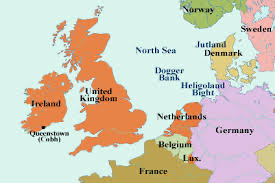The Battle of Dogger Bank
The Battle of Dogger Bank was a naval conflict between Germany and the United Kingdom during World War I. It was a victory for the U.K. in that the German fleet retreated, but it was also a wakeup call because German ships had gotten so close to the British Isles. In fact, German ships had completed raids on the English coastal towns of Hartlepool, Scarborough, and Whitby. 
The two enemies had opposed each other the year before, in the Battle of Heligoland Bight, which resulted in the German fleet's defeat and resolution to stay closer to home ports for a few months. However, by the end of 1914, German ships had shelled the English coastal towns of Hartlepool, Scarborough, and Whitby, suffering no losses and escaping without having to fight or even elude pursuit. As well, the German fleet had added four dreadnought battleships to its stores. The time was ripe, the German high command, thought, for a breakout attempt. The target was the Dogger Bank, in the middle of the North Sea. The leaders of the High Seas Fleet made their plans and transmitted them to their commanders. Unbeknownst to the German high command, U.K. codebreakers had broken the German secret code and were aware of the attack plans. 
The battle occurred on Jan. 24, 1915. As before, the Royal Navy force was stronger, numbering 47 in all, including five battlecruisers. The 26 German ships included three battlecruisers and an armored cruiser. The results were even more disparate, with German casualties exceeding 1,000. The German armored cruiser, Blücher, sank, the result of intense shelling. German forces succeeded in crippling the U.K. flagship, Lion, but the battlecruiser survived and limped back into a home port. And Royal Navy casualties were comparatively very low: 47 killed and wounded. Tactically, the battle resulted in a victory for the Royal Navy, since German ships did not again challenge for a handful of months. |
|
Social Studies for Kids
copyright 2002–2025
David White




